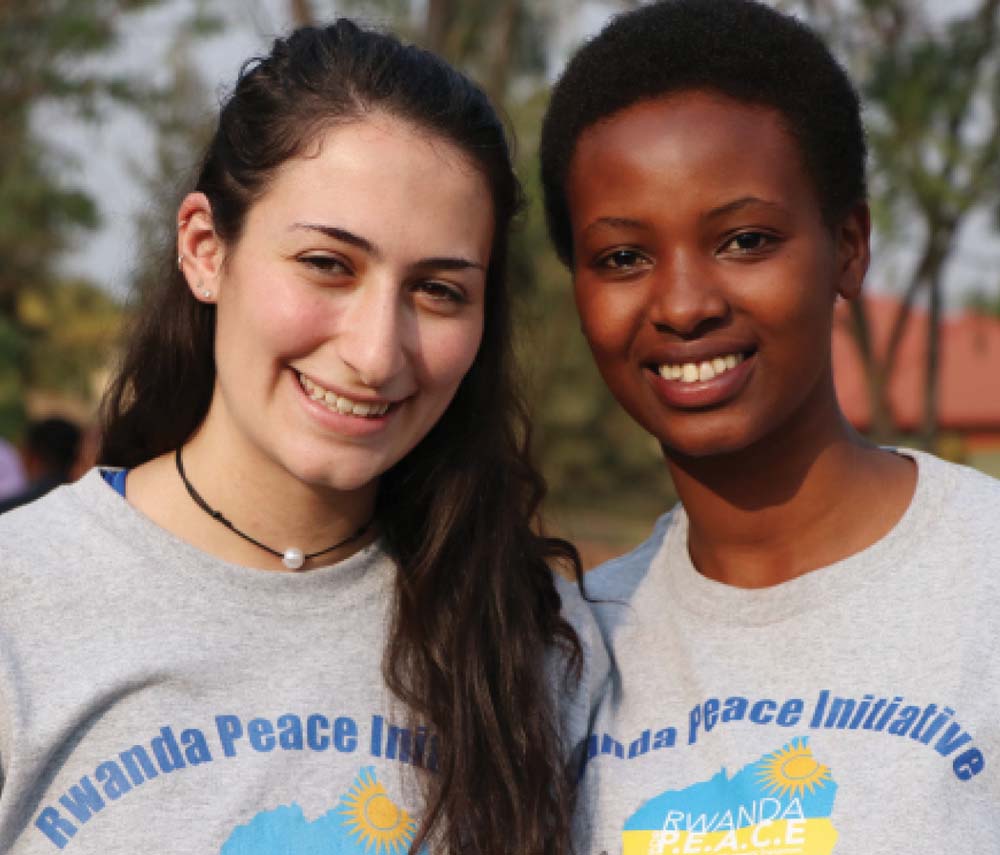Julia Lisi ’18 launched a timely project last summer to help citizens combat the kind of misinformation that can spread like wildfire among dry brush, distorting national politics and disrupting the delicate balance of civil society. In Rwanda.
Prior to and during the 1994 Rwandan genocide, Hutu-run government sources disseminated propaganda that spread by word of mouth, exacerbating the violence and killing. In fact, a 2014 study by Harvard economics professor David Yanagizawa-Drott attributed 10 percent of the violence by Hutus against the minority Tutsis, carried out by militia groups and civilians, to the incendiary broadcasts of a single state-sponsored radio station. RTLM broadcasts called Tutsis “cockroaches,” declaring that they should be exterminated—while making it tacitly clear that the government would not interfere with violence against Tutsis. “One of the reasons the genocide occurred was that people blindly accepted hateful rhetoric about the Tutsis,” says Julia Lisi ’18, “instead of questioning the motives of the people spreading the information.”
Now 24 years removed from the genocide, fears persist among Rwandans that a complex social compact and fragile peace could be fissured by falsehoods designed to obscure the horrific events of 1994. Dr. Jean-Damascène Bizimana, executive secretary of Rwanda’s National Commission for the Fight against Genocide, recently told Rwanda’s New Times that efforts to battle discrimination and genocide ideology are threatened, in part, by older Rwandans passing along fallacious, inflammatory information to youth. “We risk having genocide ideology tendencies transmitted to the next generation,” Bizimana warned.
Working with Rwandan colleagues Derrick Murekezi and Ian Manzi, undergraduates at the University of Rochester, Lisi created Critical Thinking for P.E.A.C.E. (Peace Education and Community Engagement) to reduce that risk. Last August, the organization invited 65 high school students from across Rwanda to attend a weeklong educational workshop funded by Davis Projects for Peace, a foundation that awards college students $10,000 grants to create grassroots initiatives. Lisi’s program was designed to help Rwandan teens develop the historical knowledge, media literacy, and critical thinking skills they’ll need to judiciously examine information they receive. “They were born after the genocide, but it’s important that they know how to evaluate any propaganda or speech, whether from people around them or authorities,” Lisi says. “If a parent comes to you with denial myths about the genocide, how are you going to handle that?”
Lisi developed a workshop curriculum that includes team-building activities, interactive lectures and debate, and a model United Nations segment that provides a forum for the students to test their diplomatic skills and try to reach consensus over global problems. Workshop leaders encourage participants to take what they learn back to their own schools and create similar workshops for other teens.
“It blew me away that people who had suffered such trauma had made such strides in so short a time.”
When Lisi began college with a focus on art history, she envisioned herself as a museum curator. Instead, she felt drawn to activism. A transfer student from Wheaton College, she took her first trip to Rwanda as part of a Wheaton innovation and leadership initiative led by the college president, Dennis Hanno. “I never thought I would have the chance to work with people in other countries, and that trip shaped everything,” Lisi recalls. “What surprised me the most, just 20 years after the genocide, was how resilient the people were. It blew me away that people who had suffered such trauma had made such strides in so short a time.”
After graduation, Lisi hopes to live in Rwanda for a year to continue building and expanding the program, and then pursue a doctorate in education. “My dream,” she says, “is to develop learning centers for peace around the world based on the work we are doing in Rwanda.”
Written by Chris Quirk
Photos by Mbarushimana Moise and Nkotanyi Frery
